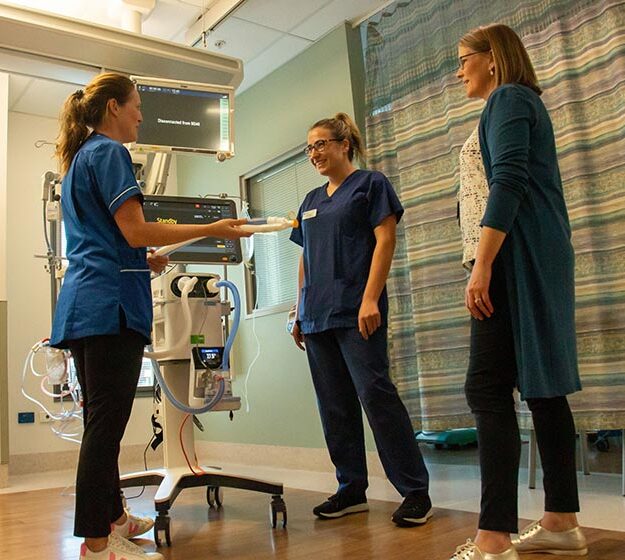College chair Tania Mitchell said another 85 ICU beds — a 30 per cent increase nationally over the next three years — announced as part of a $644 million government funding boost amid hospital fears of being overwhelmed by the Delta strain of COVID in 2021, was positive.

But it also meant New Zealand needed another 450 critical care nurses because ICUs need a 5:1 nurse-patient ratio.
“It takes 5.3 FTE nurses to staff one ICU bed 24 hours per day and that includes things such as staff annual leave, study leave, supernumerary [non-clinical] leadership roles etc,” Mitchell told Kaitiaki.
Last year, before the funding boost, the college said New Zealand was short 90 full-time critical care nurses.
The challenge for ICUs was not only finding nurses but training them, she said.
“It takes three to five years to fully train an ICU nurse to be able to independently look after a complex, critically ill patient,” Mitchell said. “So recruiting large numbers of novices is going to mean a dilution of skills and stress on the ability to care for the patients who need us.”
Mitchell said critical care nurses were working closely with Te Whatu Ora’s critical sector advisory group, of which she was a part, to solve the problem. ICU nurse recruitment was continuing from overseas and New Zealand, however efforts were being made to provide better training, she said.
Whether overseas or locally trained, the new recruits were mostly critical care “novices” and needed upskilling to critical care standards, Mitchell said. Yet there was minimal fit-for-purpose training available, something the college was also exploring with Te Whatu Ora, she said.
‘It takes three to five years to fully train an ICU nurse to be able to independently look after a complex, critically ill patient.’
Support from senior nurses was also vital to recruit and retain new nurses in critical care, she said.
‘Staged’ not immediate increase in nurses needed
Te Whatu Ora national director hospital and specialist services Fionnagh Dougan said as Te Whatu Ora was providing funding for 85 more critical care beds phased over three years, “it is a staged increase in nurses that is required, as opposed to a large increase now”.
“We are delighted to confirm that we anticipate at least 30 additional critical care beds will be fully staffed and fully resourced by the end of this financial year (end June 2023).”
Training for critical care nursing teams had been supported in 2022/23 with $3 million to support increased nurse educator and clinical coach roles, and another $0.325 million for post-graduate and vocational training.
In 2023/24, this would increase to $3.75 million, with extra going into expanding post-graduate and vocational training.
A national e-learning programme to support new entry into critical care would also be developed over two years, costing $500,000.
Internationally-qualified nurses would also contribute to the critical care nursing workforce, and would not require the same level of training, Dougan said.
“We will continue to identify what other initiatives we may need to attract, train and retrain the nurses needed to progress further.”
Nurse educators and coaches
Nurse educators had now been installed in “every single ICU”, which would also help support and retain new critical care nurses, Mitchell said. As a result, all 25 of the country’s ICUs now met intensive care standards of one nurse educator per 50 nurses — when previously only two did.
A new role — critical care clinical coach — had also been established and was in place across every ICU. Coaches were a more hands-on “bedside-based” role than educators, she said.

Both would help nurses new to ICUs develop their skills, but also support those with one to three years’ ICU experience advance clinically, she said.
Funding had also been ringfenced for post-graduate and vocational training for critical care nurses — 50 per cent of whom in ICUs were required to have post-graduate qualifications.
‘New Zealand has the second to lowest number of beds per capital in the OECD, ahead only of Mexico.’
However there were very few post-graduate critical care papers available in New Zealand presently — another “huge area of work” being looked at by the college.
The $544 million cash boost — plus another $100 million towards building extra ICU capacity — came after critical care nurses spoke out about the critical shortages during the COVID pandemic. At its peak, Mitchell was doing up to six media interviews daily.
COVID highlighted the value of critical care nurses, but also how under-prepared New Zealand was in terms of its critical care capacity, she said.
“New Zealand has the second to lowest number of beds per capital in the OECD [Organisation for Economic Cooperation and Development], ahead only of Mexico.”
In 2021, with Delta imminent, there were fears over how New Zealand would cope, as places like Italy and the United Kingdom were “overrun with patients with COVID”.
“If community transmission of Delta was widespread, there was real concern that there would not be enough intensive care beds to look after everyone who needed them.”





